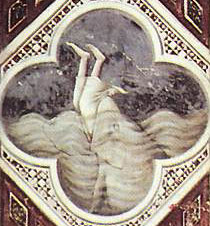JHOM - tishei - Jonah the Reluctant Prophet
|
Jonah was a reluctant prophet. He refused to obey God’s
command to bring the Gentiles in the city of Nineveh God’s promise
of forgiveness. Jonah did not believe them worthy of God’s love,
nor did he think them capable of repenting. Jonah is ultimately taught
the lesson of God’s universal love for all humankind.
The well-known book of Jonah, the fifth book of the twelve
Minor Prophets, is recited as the prophetic lesson (haftarah)
in the afternoon service of Yom Kippur.
We include below a short discussion of the book's central
message — as allegory and as parable. Please
enjoy also the poem Jonah by Gabriel
Preil (1911-1993).
|

| Jonah
swallowed up by the great fish, fresco; Cappella Scrovegni
(Arena Chapel), Padua
Giotto di Bondone, 1304-06
|
|
Although considered one Minor Prophets, the book of Jonah is a narrative rather
than a collection of oracles, visions or sermons. Jonah, the son of Amitai,
is known to us only from a reference in II kings 14:25. Here he is referred
to as a native of Gat-Hefer (in northern Israel), a contemporary of King Jeroboam
II of the Kingdom of Israel (and therefore a contemporary of Amos and Hosea).
The period is that of the Assyrian domination of Syria-Palestine, from about
725-625 BCE. We learn too that he predicted the success of Jeroboam’s
military adventures.
According to the narrative, the prophet is commanded by God to preach repentance
to Nineveh, the Assyrian capital. Jonah instead attempts to flee by boarding
a ship bound for Tarshish (perhaps on the Iberian peninsula). When the ship
encounters a storm, the sailors toss Jonah into the sea (after casting lots)
to soothe the anger of God. The storm subsides and Jonah spends several days
in the belly of a fish, crying out for mercy, until he is vomited onto the shores.
After his wonderful deliverance from drowning, he is obedient to God's second
commission; he goes to Nineveh and proclaims that it will be destroyed in forty
days; the people repent and God spares the city.
For numerous reasons, scholars conclude that the book of Jonah is either a
parable or an allegory, which borrowed the historical figure of Jonah, son of
Amitai, as protagonist to drive home a particular theological declaration. Some
scholars suggest the book is an allegory in which Jonah represents the nation
of Israel; the book, the claim assumes the form of a reading of Israel’s
history and of its obligations before God to the nations of the world. Jonah’s
unwillingness to obey God represents Israel’s deafness to the prophetic
word in the days before the Exile.
According to this view, "the storm symbolizes the political turmoil caused
by the Assyrian and Babylonian invasions of Syria-Palestine, while Jonah’s
time in the belly of the great fish represents the Babylonian exile. The vomiting
up of the prophet is emblematic of the Judean restoration; God’s second
call to Jonah is to be seen as the renewed opportunities for faith and obedience
extended to the post-exilic community. Jonah’s bitterness over the task
to which God has summoned him and over the success of his mission represent
the narrow attitude of the post-exilic Jerusalem community towards other nations.

Jonah
spewed out up by the great fish, detail; copper engraving
From "Historiae celebriores Veteris Testamenti Iconibus
representatae"
Caspar Luiken, publ. 1712
View
entire image
|
|
Other scholars, however, see Jonah less as an allegory (in which all the elements
of the story represent some external reality) and more as a parable, a story
with a single important meaning. According to this view the book of Jonah is
a reading of the state of the Jerusalem community during the years after the
return from exile, a state of mind which one finds expressed in the books of
Ezra and Nehemiah. Here is a community fearful and hostile to the outside world
with its walls (in both a literal and a spiritual sense) rebuilt and strengthened.
In such an environment the election of Israel was viewed more in terms of a
privilege than in terms of responsibility. Any notion that Israel should reach
out in compassion to share with the outside world its knowledge of the God of
Love would have been met with the same vigorous denial which the prophet demonstrates
when God first commands him to go to Nineveh to preach. According to this interpretation,
the story was told to combat the narrowness of outlook within the post-exilic
community and the historic Jonah was used to reinforce the prophetic character
of the book."[*]
The underlying theology in the book of Jonah is two-fold:
1. God’s compassion extends to all nations of the earth; and
2. Israel is under responsibility to be the vehicle by which that compassion
is made known.
The sages consciously chose this book to be read in the afternoon service,
as the Sabbath of Sabbaths, the Day of Atonement, draws to an end. As we pray
for forgiveness and for a year of life, we recall that God is the God of all
mankind, of all the Ninevehs of the world, and man, created in God’s image,
is obligated to embrace and extend that compassion.
|
[*]James D. Newsome, The Hebrew Prophets (Atlanta: John Knox
Press, 1984)
Mortimer J. Cohen, Pathways Through the Bible, (Philadelphia:
JPS, 2002)
|
|
Jonah, poem
by Gabriel Preil |
TISHREI Table of Contents
|



